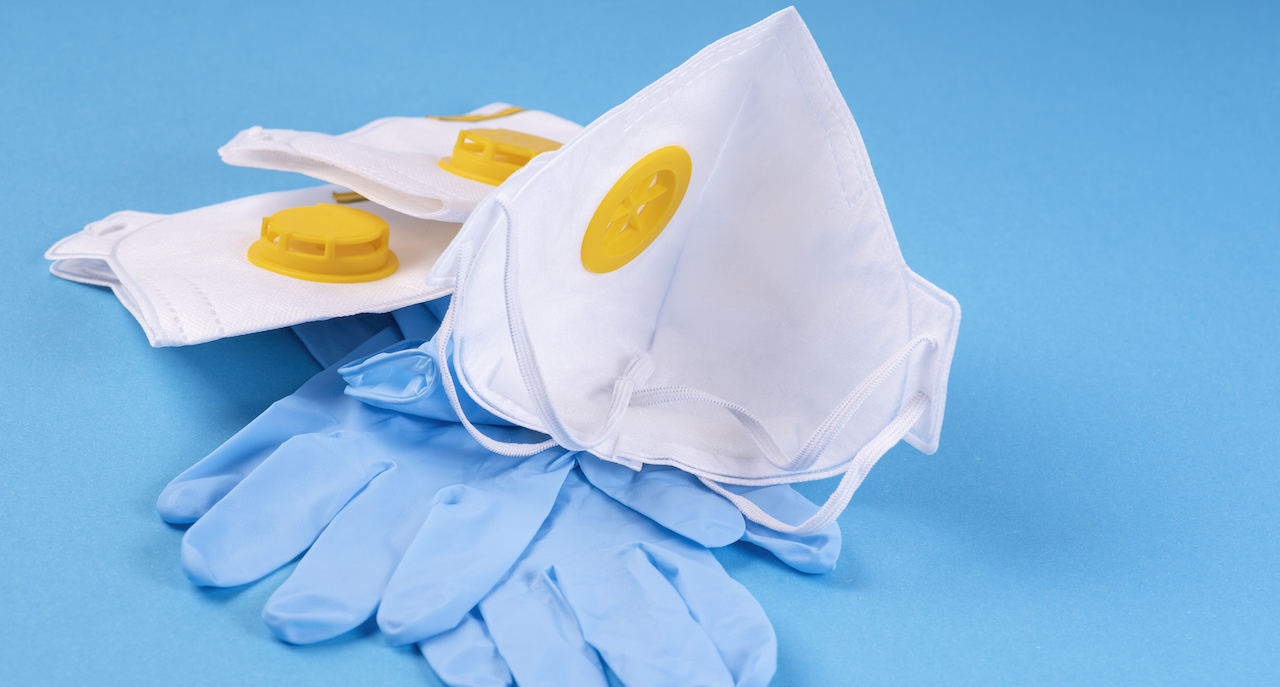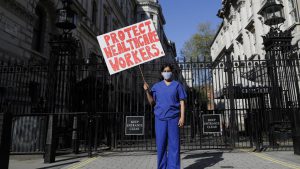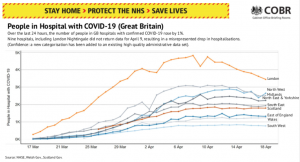Sunday 19 April 2020

PPE is in short supply but they say it is on the way (Maksymenko Nataliia )
My short stagger-stumble around London’s Hyde Park this morning was enough to show me that the country has problems ahead. The capital’s streets are unquestionably busier than barely a week ago, as my fellow Londoners individually decide that they are exempt from lockdown.
“I’ll be very quick,” I heard one say on his mobile, as I stagger-stumbled past. “I’m not infected anyway.”
“Two metres is only a guideline,” said another, speaking into a cabled microphone as he jogged. “We’re not in the vulnerable category, so it will be fine.”
Dough heads, I thought, as I went past. It seems that standard early morning behaviour in London, for the joggers, runners, cyclists and stagger-stumblers, is to use the time to make telephone calls. Hyde Park is filled with people chatting, seemingly to no one, although for a moment I think they are addressing me, until I realise that they are talking hands-free on a mobile. The Italians are particularly expressive, waving their arms this way and that as they both jog and speak.
I sense the Government will have its work cut out to ensure that the UK continues with its lockdown. Day-by-day the parks are becoming busier, the pavements as well, and the traffic has returned to becoming dangerous. No longer can I wander across a road junction without looking left or right and be sure I will reach the far side. Now I must dash, as in the old days. My risk of being run over in London is now greater than my chance of getting Covid-19.
I look at various headlines and hear that the bigwigs have offered five points that will determine when the country is ready to exit lockdown. Apparently, we need the following:
1 – Making sure the NHS can cope
I know we are supporting the NHS and all who work within it, but when was it last able to cope? There has been a complete transformation in the public presentation of our health service, from one that was criticised daily in 2019 to an organisation that can do no wrong in 2020. Remarkable. The NHS claims it is so far managing and the extra hospitals that are being built are more than underutilised. The trouble is that I do not know whom to believe as NHS staff have largely been instructed to be careful what they say to the rest of the world. Two years ago, the British Medical Journal reported that 1200 NHS staff from 194 Trusts had been disciplined for using social media or messaging apps over a five-year period. Sixty-five of those staff lost their jobs. Staff have more recently been gagged from talking about coronavirus and GPs have been told by their commissioning groups not to give interviews to the press and to avoid posting comments on social media about PPE concerns. I am unsure we can criticise China for withholding information if we are doing the same at home. The simplest thing, of course, is for the government to provide everything the NHS needs in a timely fashion. If that happened, there would not be anything to criticise.
2 – Evidence showing a sustained and consistent fall in daily death rates
We are seeing that at the moment, although I am fairly sure that the increased numbers of people, and traffic, I am beginning to see on London’s streets will convert to increased fatalities in three weeks’ time. The deaths we have recently been seeing relate well to the last period of public craziness towards the end of March. Those who thought to go out and about on the streets of Skegness or wander the low hills of the Peak District National Park, need to consider, in retrospect, if their journey was worthwhile. Did that stroll beside the sea justify the sickness and deaths that followed? Somehow, I doubt it.
3 – Reliable data showing the rate of infection is decreasing to manageable levels
The number of infections is clearly rising but the infection rate has remained steady for several days. The London hospital admission rate for Covid-19 is falling but the North-West was looking suspicious when I saw the evening figures. I sensed that a point may soon be reached when there will be more people in hospital outside London than within. The North-West seems the worst place to be. Soon, it will be time for those outside London to stop saying to Londoners that they cannot visit different parts of the country. It will be the turn of Londoners to say they don’t want to go there anyway, as the areas outside the capital are too pestilent.
4 – Being confident in the range of operational challenges, like ensuring testing and the right amount of PPE, are in hand
I will believe the testing when I see it, which was why I paid for my own. Both antigen and antibody testing are currently available, but the antibody tests are presently being faulted for their accuracy. The government has pledged to undertake 100,000 tests daily by the end of April. At the moment the NHS and Public Health England laboratories have the ability to undertake 20,771 tests daily, with a further 14,300 at 26 privately operated drive-through sites across the country. Doubtless those numbers will increase, and it will be interesting to see how the government achieves that. As for PPE, oh dear. Protection of healthcare workers is manifestly below standard. Pledges that PPE is shortly to be delivered have not been upheld. Eighty-four tonnes of the stuff were meant to have arrived from Turkey today and did not do so. Public Health England (PHE) has amended its guidance, I assume on the basis of the PPE shortage. In response, the Royal College of Surgeons of England (RCSE) has instructed its members – I am one of them – not to risk their health if appropriate PPE is unavailable. This is the message I received recently from the RCSE President-Elect:
“We are deeply disturbed by this latest change to PPE guidance, which was issued without consulting expert medical bodies. After weeks of working with PHE and our sister medical royal colleges to get the PPE guidance right, this risks confusion and variation in practice across the country.
The new guidance implies that, even in the operating theatre, surgeons and their teams may not require proper PPE. This is simply unacceptable. Whilst we appreciate that waterproof laundered gowns may still be available in many operating theatres, the proposed alternatives to fluid repellent gowns or coveralls are wholly inadequate for an operating theatre environment.
Theatres are high risk areas where surgical teams are inevitably exposed. Like all doctors, surgeons are committed to their patients. We know many will put themselves in the firing line. However, if fluid repellent gowns or coveralls are not available, then surgeons should not risk their health.

Dr Meenal Viz protesting in Downing Street (Kirsty Wigglesworth_AP)
We must not forget either the desperate needs of thousands of patients who still require life-saving surgery – road accident victims, people with severe appendicitis or those needing urgent cancer operations. If these operations can’t go ahead, many will die. We are calling on government to ensure that the depleted PPE supplies that remain, are used to maintain the most urgent and emergency services.”
My boss has spoken.
One doctor, Meenal Viz, who happens also to be pregnant, has taken her protest to Downing Street itself. She staged a lone demonstration there today holding a placard, which read, “Protect Healthcare Workers.” The protest could not have been easy, so congratulations to Dr Viz on having the courage to stand up and be counted.
5 – Being confident any adjustments will not risk a second peak
How can one ever be confident that there will be no second peak? This would be flying in the face of history. To my mind the situation is simple. There will be a second peak. There may even be others to follow. The only real hope is that the virus does not mutate between now and then and make the second peak worse than the first. It is likely that what we have here is the beginning. It would be wrong for anyone to give the impression it was the end.
It sounds to me as if lockdown should continue.

